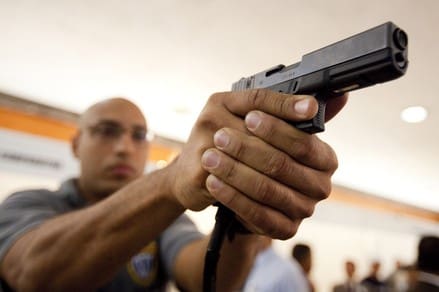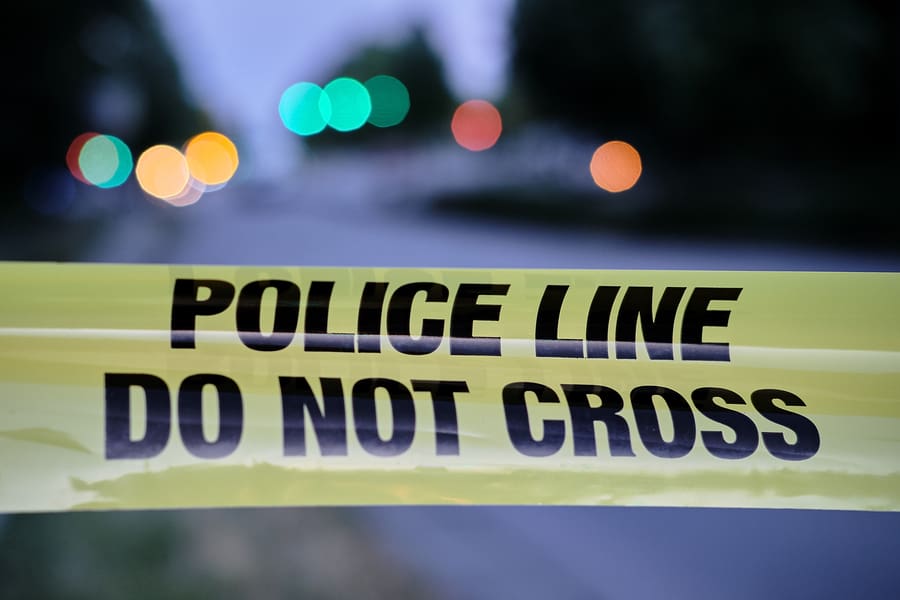OMG! You couldn’t let just ANYONE own a handgun could you? What about training? They might shoot someone with that thing! You know: a child. Think of the children! Not to mention the handgun’s effect on urban crime. So what if the gun buyer’s not a criminal? The more guns you introduce into an area suffering from gun violence, the more gun violence you’ll have, right? And what of a cooling off period? Someone who’s really angry could buy a handgun and shoot someone, just like that. Here’s the thing: gun control makes perfect sense. Anyone with an ounce of common senses wants all gun owners to be educated about their weapon’s operation and general firearms safety. Any worthwhile member of society wants to keep guns out of the hands of criminals. Ditto a pro-murder stance. But it’s one of those “should society protect its citizens from themselves” deals. On the one hand, gun licensing laws prevent some of the problems associated with handguns. On the other hand this, from fox59.com.
INDIANAPOLIS – Metro police are trying to piece together what led to a shooting that killed a 66 year-old man.
It happened last night near 25th Street and North LaSalle on the city’s east side. Police said they were actually called to the same home Friday night, when a man told police he was being threatened by several men with guns.
The following night, he was found dead. Police are still searching for a motive. They are still trying to determine whether the two calls are related.
Sounds like coincidence to me. Anyway, suffice it to say, the dead man shares the same status as the hopefully-soon-to-apprehended shooter or shooters: innocent until proven guilty. But it’s still worth noting that even drug dealers are known to call the police for personal protection from time to time.
Set those issues to a aide for a moment. This case highlights a problem with gun licensing laws: they stop people from buying guns.
It’s easy to contemplate the dangers of gun ownership, look at existing handgun buyers and conclude that there’s nothing wrong with making them jump through a few hoops and cool their jets before they tool up. Existing gun owners are a fairly motivated lot.
Duh. They have to be. Whether by licensing fees or testing/training/police interview requirements, most states have successfully excluded “casual” gun owners from the ownership pool.
These non-enthusiast non-gun owners live on the other side of the gun cultural divide. They have no relevant experience re: buying, storing, firing, maintaining and, perhaps, carrying a handgun. Lest we forget, the mainstream media bans all gun advertising.
As stated above, you can make a compelling case for preventing ignoramuses from buying a lethal weapon until and unless they can prove that they need a firearm, and can understand, accept and implement the responsibilities inherent to gun ownership. That kind of gun control is a good thing—right until it isn’t.
When people who wouldn’t normally even think of owning a gun suddenly decide that they need one, they really, really need one. But in many states, they can’t get one. Not right away. And when do they need it? Right away.
The story chronicled above is not some weird aberration. Remember radio talk show host Alan Berg. He’s only the most prominent example of a person who thought they were in mortal danger, and was. Berg was in the process of getting a gun when he was gunned down by white power extremists.
And it’s not just people who’ve been threatened who want/need immediate access to a firearm. People who’ve already been attacked/burglarized often feel a sudden, entirely understandable need to own a gun NOW. They want to do something NOW to stop an assault from happening AGAIN, which could happen SOON. Do criminals re-assault their victims? You bet your life they do. Or not.
I know a woman who was raped who couldn’t leave her house until she had a gun. She couldn’t get to the gun store to begin the process of purchasing a firearm—until a friend lent her a gun. When she told the local police chief why she wanted a gun, he declined to issue a concealed carry permit. She moved states.
I don’t mean to anecdote you into rhetorical submission. For every example of a private citizen suffering violence or psychological damage because they couldn’t get access to a handgun, there could be ten times the number of innocent people who’ve been injured or killed gun crime, and plenty of cases of lethal irresponsibility.
Society has to choose sides in this dilemma. And it does. The simple truth is that where you live determines how, when and whether or not you can get timely access to a handgun. And, unfortunately, who you are. Check out this story about California concealed carry permits in modbee.com:
Matt Speckman, a former Turlock police sergeant, used to be in charge of processing concealed gun permits. Now retired, he’d like one himself.
“I’m not a gun nut,” Speckman said. “But I’ve been involved in investigations of people now getting paroled who have probably been throwing darts at my picture in their cells.”
Speckman, 49, attended the FBI academy, trained at a nationally recognized firearms course, earned an MBA, is studying for a Ph.D, toted a gun for 30 years and screened gun permit applicants for seven years.
Yet Turlock Police Chief Gary Hampton and Sheriff Adam Christianson, both of whom have approved gun permits for politicians and prominent businessmen, turned him down.
Despite these ongoing and not entirely unexpected difficulties with the fairness of states with “may issue” licensing procedures, it’s clear that gun rights are currently ascendant. More and more states are converting to “shall issue” rules, which forces licensing authorities to prove why a citizen shouldn’t have a gun, rather than the citizen having to prove that they should. Concealed carry laws are becoming less restrictive,
Gun control advocates see this “liberalization” trend as a disturbing sign of growing paranoia, both political and personal. Perhaps so. I like to view the trend as an indication that the average American is taking responsibility for their own defense. And I pray that this faith in the power of self-reliance extends, or will extend, to their relationship with the government.
Meanwhile, I don’t think that the legislative roll-back on gun control is going far enough. I believe licensing authorities need to make it possible for any and every law-abiding citizen to purchase a handgun easily, quickly and cheaply. At the same time, society needs to lift the ban on gun advertising so that the free market can play its natural role as a source of information and education.
I don’t argue for this repeal of existing hurdles to handgun ownership under the banner of “more guns, less crime.” If guns were more accessible, there’s little doubt that you’d see a rise in the number of firearm fatalities (in absolute if not relative terms). Instead, I argue for a dramatic reduction in the the government’s power to restrict gun ownership so that every American can defend their life and the lives of heir loved ones as and when they need to do so.




